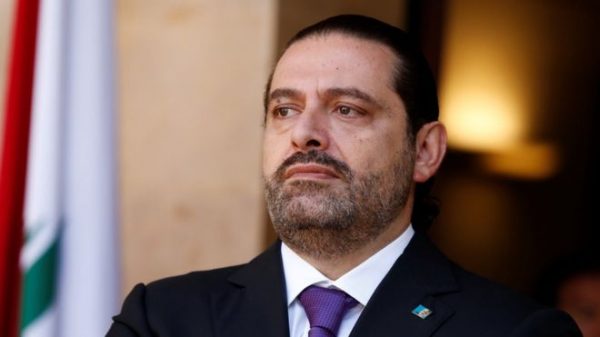 Lebanese Prime Minister Saad Hariri resigned Saturday in a surprise move that upended his alliance with the powerful Hezbollah movement and raised the risk of conflict in Lebanon.
Lebanese Prime Minister Saad Hariri resigned Saturday in a surprise move that upended his alliance with the powerful Hezbollah movement and raised the risk of conflict in Lebanon.
Hariri announced his resignation in Saudi Arabia and cited the influence of Iran over the Lebanese government as the reason for his decision to step down, putting Lebanon squarely on the front line of an accelerating power struggle between Tehran and Riyadh.
Through Hezbollah, Iran has created “a state within a state” in Lebanon, Hariri said in a televised address from Riyadh. He accused Iran of sowing “sedition, devastation and destruction in any place it settles in.”
“I want to tell Iran and its followers that they are losing in their interferences in the affairs of Arab nations. Our nation will rise just as it did before, and the hands that will harm it will be cut,” Hariri said, suggesting that his move represented the beginning of a broader effort backed by Saudi Arabia to confront Iran in Lebanon.
Hariri said Hezbollah and Iran had brought Lebanon into the “eye of a storm” of international sanctions. Iran was sowing strife, destruction and ruin wherever it went and he accused it of a “deep hatred for the Arab nation”.
His resignation, a big surprise to Beirut’s political establishment, brought down the coalition government and plunged Lebanon into a new political crisis.
It thrust Lebanon into the front line of a regional competition between Sunni Saudi Arabia and Shi‘ite Iran that has also buffeted Syria, Iraq, Yemen and Bahrain. A Saudi government minister said Hariri was in Riyadh to ensure his safety.
Hariri, who is closely allied with Saudi Arabia, alleged in a broadcast from an undisclosed location that Hezbollah was “directing weapons” at Yemenis, Syrians and Lebanese.
In comments directed at Iran, he said the Arab world would “cut off the hands that wickedly extend to it”.
Hariri’s coalition, which took office last year, grouped nearly all of Lebanon’s main parties, including Hezbollah. It took office in a political deal that made Michel Aoun, a Hezbollah ally, president, and was seen as a victory for Iran.
The resignation risks exacerbating sectarian tensions between Sunni and Shi‘ite Muslims and returning Lebanon to paralysis in government.
An official at the U.S. State Department said it was following the situation closely and noted that Hariri had been a “strong partner in building strong national state institutions and in the war on terror”.
The official added “the United States expects an orderly political process in Lebanon and will remain supportive of the legitimate institutions of the Lebanese state”.
It was not immediately clear who might succeed Hariri, Lebanon’s most influential Sunni politician.
The prime minister must be a Sunni in Lebanon’s sectarian system. Aoun must appoint the candidate with most support among MPs, who he is expected to consult in the coming days.
“We are living in a climate similar to the atmosphere that prevailed before the assassination of martyr Rafik al-Hariri. I have sensed what is being plotted covertly to target my life,” Hariri said.
Rafik al-Hariri was killed in a 2005 Beirut bomb attack that pushed his son Saad into politics and set off years of turmoil. A U.N.-backed tribunal has charged five Hezbollah members over the killing. Hezbollah denies involvement.
The Saudi-owned pan-Arab television channel al-Arabiya al-Hadath reported that an assassination plot against Hariri was foiled in Beirut days ago, citing an unnamed source.
Saudi Arabia’s Gulf Affairs Minister Thamer al-Sabhan said in a television interview that Hariri’s personal security detail had “confirmed information” of a plot to kill him.
Hariri said Hezbollah and Iran had brought Lebanon into the “eye of a storm” of international sanctions. Iran was sowing strife, destruction and ruin wherever it went and he accused it of a “deep hatred for the Arab nation”.
Aoun’s office said Hariri had called him from “outside Lebanon” to inform him of his resignation. He has postponed a visit to Kuwait and directed military and security agencies “to maintain stability”, it said.
WASHINGTON POST

Leave a Reply
You must be logged in to post a comment.